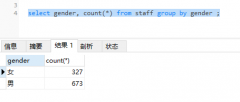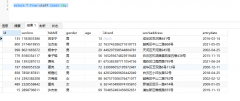Database on the fly with scripting languages(使用脚本语言动态数据库)
问题描述
我有一组要处理的 .csv 文件.使用 SQL 查询处理它会容易得多.我想知道是否有某种方法可以加载 .csv 文件并使用 SQL 语言通过诸如 python 或 ruby 之类的脚本语言来查看它.用类似于 ActiveRecord 的东西加载它会很棒.
I have a set of .csv files that I want to process. It would be far easier to process it with SQL queries. I wonder if there is some way to load a .csv file and use SQL language to look into it with a scripting language like python or ruby. Loading it with something similar to ActiveRecord would be awesome.
问题是我不想在运行我的脚本之前在某处运行数据库.除了脚本语言和一些模块之外,我不需要额外的安装.
The problem is that I don't want to have to run a database somewhere prior to running my script. I souldn't have additionnal installations needed outside of the scripting language and some modules.
我的问题是我应该使用哪种语言和哪些模块来完成这项任务.我环顾四周,找不到适合我需要的任何东西.甚至有可能吗?
My question is which language and what modules should I use for this task. I looked around and can't find anything that suits my need. Is it even possible?
推荐答案
sqlite3,包含在python中.使用它,您可以创建一个数据库(内存)并向其中添加行,并执行 SQL 查询.
There's sqlite3, included into python. With it you can create a database (on memory) and add rows to it, and perform SQL queries.
如果你想要简洁的类似 ActiveRecord 的功能,你应该添加一个外部 ORM,比如 sqlalchemy.不过这是一个单独的下载
If you want neat ActiveRecord-like functionality you should add an external ORM, like sqlalchemy. That's a separate download though
使用 sqlalchemy 的快速示例:
Quick example using sqlalchemy:
from sqlalchemy import create_engine, Column, String, Integer, MetaData, Table
from sqlalchemy.orm import mapper, create_session
import csv
CSV_FILE = 'foo.csv'
engine = create_engine('sqlite://') # memory-only database
table = None
metadata = MetaData(bind=engine)
with open(CSV_FILE) as f:
# assume first line is header
cf = csv.DictReader(f, delimiter=',')
for row in cf:
if table is None:
# create the table
table = Table('foo', metadata,
Column('id', Integer, primary_key=True),
*(Column(rowname, String()) for rowname in row.keys()))
table.create()
# insert data into the table
table.insert().values(**row).execute()
class CsvTable(object): pass
mapper(CsvTable, table)
session = create_session(bind=engine, autocommit=False, autoflush=True)
现在可以查询数据库,按任意字段过滤等
Now you can query the database, filtering by any field, etc.
假设你在这个 csv 上运行上面的代码:
Suppose you run the code above on this csv:
name,age,nickname
nosklo,32,nosklo
Afila Tun,32,afilatun
Foo Bar,33,baz
这将在内存中创建并填充一个包含字段name、age、nickname 的表.然后就可以查询表了:
That will create and populate a table in memory with fields name, age, nickname. You can then query the table:
for r in session.query(CsvTable).filter(CsvTable.age == '32'):
print r.name, r.age, r.nickname
这将自动创建并运行 SELECT 查询并返回正确的行.
That will automatically create and run a SELECT query and return the correct rows.
使用 sqlalchemy 的另一个优点是,如果您决定将来使用另一个更强大的数据库,您可以在不更改代码的情况下实际使用.
Another advantage of using sqlalchemy is that, if you decide to use another, more powerful database in the future, you can do so pratically without changing the code.
这篇关于使用脚本语言动态数据库的文章就介绍到这了,希望我们推荐的答案对大家有所帮助,也希望大家多多支持编程学习网!
本文标题为:使用脚本语言动态数据库


- 如何将 Byte[] 插入 SQL Server VARBINARY 列 2021-01-01
- 在SQL中,如何为每个组选择前2行 2021-01-01
- 导入具有可变标题的 Excel 文件 2021-01-01
- SQL 临时表问题 2022-01-01
- 远程 mySQL 连接抛出“无法使用旧的不安全身份验证连接到 MySQL 4.1+"来自 XAMPP 的错误 2022-01-01
- 以一个值为轴心,但将一行上的数据按另一行分组? 2022-01-01
- 使用 Oracle PL/SQL developer 生成测试数据 2021-01-01
- 如何使用 pip 安装 Python MySQLdb 模块? 2021-01-01
- 更改自动增量起始编号? 2021-01-01
- 如何将 SonarQube 6.7 从 MySQL 迁移到 postgresql 2022-01-01









